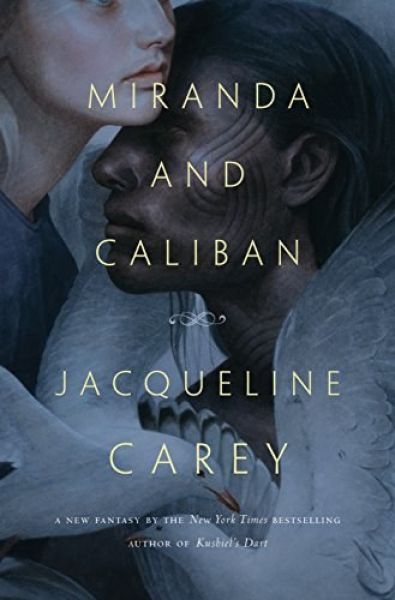Fall for Pretty Strangers
Miranda and Caliban
By Jacqueline Carey

9 May, 2017
0 comments
Jacqueline Carey’s Miranda and Caliban is a standalone retelling of Shakespeare’s novelization of Forbidden Planet, which for some reason he called The Tempest.
Determined to have revenge on his usurping brother Antonio and Antonio’s ally, the King of Naples, Prospero has retreated to a deserted island to hone his magical skills. Usurping the witch Sycorax’s legacy for his own, he is determined to use every resource at his disposal to punish his enemies.
This book does not tell Prospero’s story. Shakespeare already did that. It focuses on his naïve daughter Miranda.
Miranda has lived on the island all of her conscious life. She has only poorly understood and fragmentary memories of a life before the island. Because her father is her only teacher, because she has no other companions, she has no reason not to take Prospero’s version of the facts as entirely truthful. Until Prospero’s decision to capture and tame Caliban, the long-dead Sycorax’s feral child, ends her childish trust.
Prospero is curious to see if the boy can be remade into a civilized person — not because Prospero is charitable and kind, but because he has a very strong suspicion that locked inside the inarticulate boy’s head are his mother’s secrets. Prospero wants those secrets, as they will allow Prospero bind the air spirit Ariel to his will. Prospero’s harsh methods fail. Kindly Miranda’s do not. Prospero gains two new servants: brutish Caliban and enigmatic Ariel, bound to him by magic and cruelty.
Arial and Caliban provide Miranda with something she never had before: perspectives other than her father’s. Caliban is more than the beast her father believes. What she learns will open her heart to budding romance.
Prospero’s plan reaches its final stage, which will require Miranda’s help. He expects that she will give it; she is his daughter, is she not? But Miranda has grown beyond unthinking obedience. She knows that Prospero loves her … but values her only so long as she serves his ends. Serving her father’s plan means betraying her beloved Caliban, which seems impossible. But betraying her father is just as impossible: a disappointed Prospero will take terrible revenge on Caliban,
~oOo~
There must be a name for the genre of fiction in which authors rework Shakespeare. There are certainly enough examples to warrant one. What that name might be I do not know.
Given Prospero’s treatment of Caliban and Ariel (not to mention the episode where he nearly beats Miranda to death) readers may suspect that Prospero was a terrible king. One wonders if his overthrow came as a relief to Prospero’s former subjects. Of course, the King of Naples will want his taxes, but presumably so did Prospero. Plus, the King of Naples doesn’t use people as magical components. No doubt Prospero’s subjects were quick to see the advantages of being conquered by Naples; if there is one thing that defines this period of Italian history, it is enlightened self-interest.
Miranda and Caliban is a lot less NSFW than Carey’s Kushiel books (admittedly not a high bar). Sex does rear its head but it’s awkward fumbling between two ignorant, repressed teens, one of whom has a violent, spellcasting father. Their amorous attraction is not so much erotic as worrisome; the reader legitimately worries for the safety of the two kids.
Even though this novel was released on Valentines Day, it is not a happy, feel-good romance. It sticks to the original story, which cannot end happily for Miranda and Caliban, at least within the scope of the play. If there is hope, it can only be in the characters’ future.
Miranda and Caliban is available here (Amazon) and here (Chapters-Indigo).
Please send corrections to jdnicoll at panix dot com
